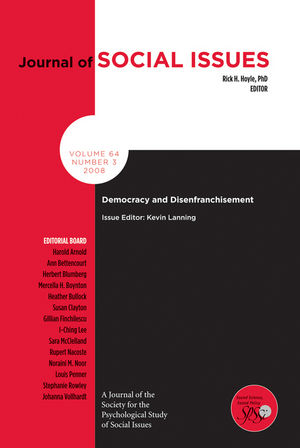Democracy and DisenfranchisementISBN: 978-1-4051-9126-5
Paperback
300 pages
September 2008, Wiley-Blackwell
 |
||||||
INTRODUCTION
Democracy, Voting, and Disenfranchisement in the United States: A Social Psychological Perspective 431
Kevin Lanning
NORMATIVE PERSPECTIVES: THE FUNCTIONS OF POLITICAL PARTICIPATION
The Psychology of Enfranchisement: Engaging and Fostering Inclusion of Members through Voting and Decision-Making Procedures 447
Celia M. Gonzalez and Tom R. Tyler
A Game-Theoretic View of Voting 467
Joachim I. Brueger and Melissa Acevedo
Electoral Simultaneity: Expressing Equal Respect 487
Dennis F. Thompson
DIFFERENTIAL PERSPECTIVES: CHARACTERISTICS OF THE VOTER
The Psychological and Institutional Determinants of Early Voting 503
Paul Gronke and Daniel Krantz Toffey
Why Do People Vote? A Psychological Analysis of the Causes of Voter Turnout 525
Joshua Harder and Jon A. Krosnick
Beliefs about Deliberation: Personal and Normative Dimensions 551
Eugene Borgida, Keilah A. Worth, Brad Lippmann, Damla Ergun, and James Farr
DYNAMIC PERSPECTIVES: THE ROOTS OF POLITICAL PARTICIPATION
Political Participation and Cumulative Disadvantage: The Impact of Economic and Social Hardship on Young Citizens 571
Julianna Sandell Pacheco and Eric Pultzer
The "Antidemocratic Personality" Revisited: A Cross-NationalInvestigation of Working-Class Authoritarianism 595
Jaime L. Napier and John T. Jost
Race and Redistricting: What the Print Media Conveys to the Public about the Role of Race 619
Damla Ergun, Grace Deason, Eugene Borgida, and Guy-Uriel Charles
COMMENTARY
Will Democracy Win? 639
Gina V. Caprara
2007 SPSSI PRESIDENTIAL ADDRESS
Introduction to Irene Hanson Frieze's SPSSI Presidential Address 661
Marybeth Shinn
Social Policy, Feminism, and Research on Violence in Close Relationships 665
Irene H. Frieze



